Related Research Articles
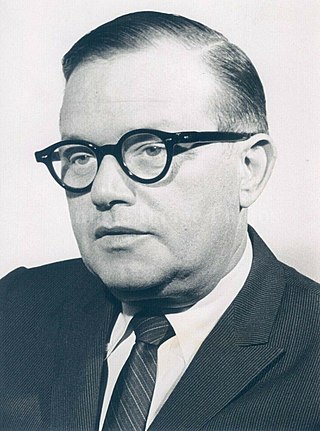
Jule Styne was an English-American songwriter and composer best known for a series of Broadway musicals, including several famous frequently-revived shows that also became successful films: Gypsy,Gentlemen Prefer Blondes, and Funny Girl.

Harlequinade is a British comic theatrical genre, defined by the Oxford English Dictionary as "that part of a pantomime in which the harlequin and clown play the principal parts". It developed in England between the 17th and mid-19th centuries. It was originally a slapstick adaptation or variant of the Commedia dell'arte, which originated in Italy and reached its apogee there in the 16th and 17th centuries. The story of the Harlequinade revolves around a comic incident in the lives of its five main characters: Harlequin, who loves Columbine; Columbine's greedy and foolish father Pantaloon, who tries to separate the lovers in league with the mischievous Clown; and the servant, Pierrot, usually involving chaotic chase scenes with a bumbling policeman.
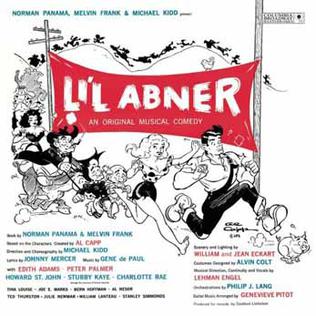
Li'l Abner is a 1956 musical with a book by Norman Panama and Melvin Frank, music by Gene De Paul, and lyrics by Johnny Mercer. Based on the comic strip Li'l Abner by Al Capp, the show is, on the surface, a broad spoof of hillbillies, but it is also a pointed satire on other topics, ranging from American politics and incompetence in the United States federal government to propriety and gender roles.
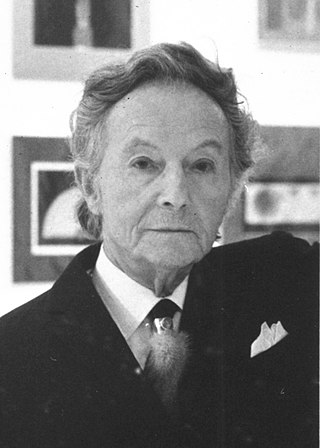
Romain de Tirtoff, known by the pseudonym Erté, was a Russian-born French artist and designer. He was a 20th-century artist and designer in an array of fields, including fashion, jewellery, graphic arts, costume and set design for film, theatre, and opera, and interior decor.

Chita Rivera, is an American actress, singer and dancer best known for originating roles in Broadway musicals including Anita in West Side Story, Velma Kelly in Chicago, and the title role in Kiss of the Spider Woman. She is a ten-time Tony Award nominee and a three-time Tony Award recipient, including one for Lifetime Achievement. She is the first Latina and the first Latino American to receive a Kennedy Center Honor and is a recipient of the Presidential Medal of Freedom.
George Hearn is an American actor and singer, primarily in Broadway musical theatre.
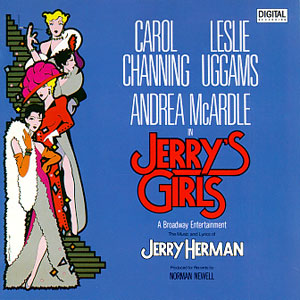
Jerry's Girls is a musical revue based on the songs of composer/lyricist Jerry Herman.
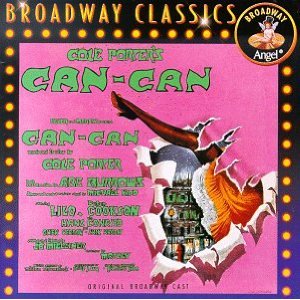
Can-Can is a musical with music and lyrics by Cole Porter, and a book by Abe Burrows. The story concerns the showgirls of the Montmartre dance halls during the 1890s.

Chita Rivera: The Dancer's Life is a musical revue based on the life of Chita Rivera, with a book by Terrence McNally, original songs by Stephen Flaherty and Lynn Ahrens, and additional songs from various other composers' catalogs. It earned Rivera her ninth Tony Award nomination.

The Rink is a musical with a book by Terrence McNally, lyrics by Fred Ebb, and music by John Kander, the tenth Kander and Ebb collaboration.
Wonderworld may refer to:

Merlin is a musical based on a concept by popular illusionist Doug Henning and Barbara De Angelis, written by Richard Levinson and William Link, with music written by Elmer Bernstein and lyrics by Don Black.

Gretchen Wyler was an American actress and dancer. She was also an animal rights advocate and founder of the Genesis Awards for animal protection.
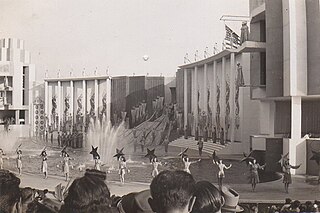
Billy Rose's Aquacade was a music, dance and swimming show produced by Billy Rose at the Great Lakes Exposition in Cleveland, Ohio during its second year, in 1937. The show featured Olympians Johnny Weissmuller, Eleanor Holm Jarret, Dick Degener, and other performers in a 5000-seat amphitheater that could seat 2000 diners. There was a 128 foot wide floating stage constructed on barges that could be moved to shore electrically for use as a dance floor. Dance bands such as Wayne King, Shep Fields, and Glen Gray and his Casa Loma Orchestra performed there.
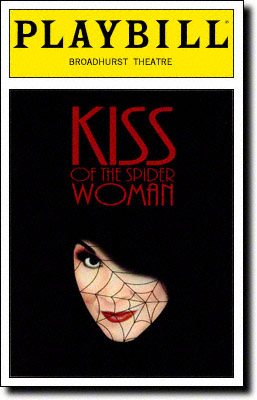
Kiss of the Spider Woman is a musical with music by John Kander and Fred Ebb, with the book by Terrence McNally. It is based on the Manuel Puig novel El Beso de la Mujer Araña. Directed by Harold Prince, the musical had runs in the West End (1992) and Broadway (1993) and won the 1993 Tony Award for Best Musical.

The Visit is a musical with a book by Terrence McNally, lyrics by Fred Ebb, and music by John Kander.
Tony Mordente is an American dancer, choreographer, actor, and television director.
The Philanthropist is a play by Christopher Hampton, written as a response to Molière's The Misanthrope. After opening at the Royal Court Theatre, London in August 1970, the piece, directed by Robert Kidd, transferred to the May Fair Theatre in the West End and ran there for over three years, subsequently going on a regional tour in 1974. In the meantime, the play, directed once again by Kidd, premiered on Broadway in March 1971, running till May of the same year. Kidd had previously collaborated with Hampton on When Did You Last See Your Mother? (1964), which had also been staged at the Royal Court Theatre.
Georgina Pazcoguin is an American ballerina. She is a soloist with the New York City Ballet, and is known for challenging racism in ballet, and for performing on Broadway.

Balan Wonderworld is a 2021 platform game principally developed by Arzest and published by Square Enix. Assuming the role of two children guided by a magical being called Balan, the player explores twelve worlds themed after the hearts of troubled individuals. They explore levels, collecting items to progress to further areas and using a variety of powers unlocked using themed costumes.
References
- ↑ Susan Lardner, "Wonderworld," The New Yorker, September 28, 1963, p. 36
- ↑ Seff, Richard (2006). Supporting Player: My Life Upon the Wicked Stage. Xlibris Corporation. p. 189, ISBN 1-4257-3933-4
- ↑ The New York World's Fair Guidebook, 1964/1965
- ↑ Pecktal, Lynn (1999). Costume Design: Techniques of Modern Masters. Back Stage Books. ISBN 0-8230-8812-X, p. 69
- ↑ The New York Times, July 1, 1964, p. 21
- ↑ Suskin, Steven. Show tunes: the songs, shows, and careers of Broadway's major composers, pp. 235-36, Oxford University Press US, 2000 ISBN 0-19-512599-1
- ↑ The New York Times Walter Carlson, June 3, 1964, p. 37; Robert Alden, July 6, 1964, p. 30; and Phillip Dougherty, July 19, 1964, p. 64
- Shepard, Richard F. "At the Fair: A Lavish Wonder World", The New York Times, May 18, 1964, p. 32